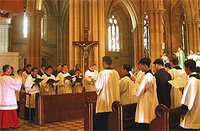New Wine, News Skins: A response to an article on Vespers at St Mary's Cathedral
 Last Friday, CathNews service reported about Vespers returning to St Mary’s Cathedral, Sydney. For the story in question, go here.
Last Friday, CathNews service reported about Vespers returning to St Mary’s Cathedral, Sydney. For the story in question, go here.Having read the story, I am concerned that what was put forward actually undermines what the Liturgy of the Hours can mean for all faithful – and instead, reinforces age old perceptions of the Hours that are outdated and not helpful.
My first concerns were raised when I read:
The Catholic Weekly reports that Vespers (Evening Prayer) is part of the Divine Office recited daily by priests and sung in communities of priests and religious.
Yes. This is true. It is recited by priests and religious on a daily basis…but the article implies in only mentioning those groups – that only they are the ones that do – and can.
This is a nonsense.
The General Instruction of the Liturgy of the Hours clearly states in Article 21:
Wherever possible, other groups of the faithful should celebrate the liturgy of the hours communally in church. This especially applies to parishes - the cells of the diocese.
…and later in Article 27:
Lay groups gathering for prayer, apostolic work, or any other reason are encouraged to fulfill the Church's duty, by celebrating part of the liturgy of the hours. The laity must learn above all how in the liturgy they are adoring God the Father in spirit and in truth; they should bear in mind that through public worship and prayer they reach all humanity and can contribute significantly to the salvation of the whole world.
This clearly demonstrates the role the laity play in participating in the Hours. So we see through this that the practice of the Hours is not confined only to religious and priests. The Prayer of the Church is exactly that! Not the Prayer of the Ordained/ Religious!
The scope for more and more people to participate in the Liturgy of the Hours was even pushed by the late Pope John Paul II. In December 2004, JPII granted a plenary indulgence for all those who participated in the Liturgy of the Hours. This was granted ‘to all faithful’…not just the monks, religious and clergy so accustomed to this form of prayer. The decree reads:
A Plenary Indulgence is also granted, under the aforesaid conditions, to the clergy, to members of Institutes of Consecrated Life and Societies of Apostolic Life, and to other faithful who are by law obliged to recite the Liturgy of the Hours, as well as to those who customarily recite the Divine Office out of pure devotion, each and every time they recite - at the end of the day, in company or in private - Vespers and Night Prayers before the Lord present in the tabernacle.
Again, it is clear that this is a form of prayer open to all.
Further, the General Instruction of the Liturgy of the Hours also highlights the importance of the domestic setting of daily prayer:
Finally, it is of great advantage for the family, the domestic sanctuary of the Church, not only to pray together to God but also to celebrate some parts of the liturgy of the hours as occasion offers, in order to enter more deeply into the life of the Church
The CathNews article does not mention this important aspect of what the Liturgy of the Hours can be for the domestic Church and families. Why has CathNews reported and contextualised Vespers – as part of the Liturgy of the Hours – in such a limited, exclusive way? This is not helpful in developing a clear understanding about what the Liturgy of the Hours can – and should – mean for all faithful.
The second issue of concern is the comment made by Bishop Julian Porteus that Vespers will be:
"a chance for people to witness the Vespers and also see our new seminarians"
There is a real danger here in seeing Vespers as something that people can ‘witness’. The prayer of the Church is not a spectacle! It is not a performance! It is the prayer of the Church.
Where is the Vatican II clarion call of ‘full, active and conscious participation’ when such a statement is made as quoted by Bishop Porteus? Sure, many people may not be familiar with the Liturgy of the Hours because it has been for so many years – a form of liturgical practice only experience by cloistered communities and the ordained….and the idea of people being ‘witness’ to this as something new to them is an noble idea. But these things can be said in ways that are more sensitive to the participatory needs of the faithful.
The experience might be new for people. It doesn’t mean the ordained have the right to - and continue the practice of it being seen as something that ‘only the religious and ordained do’.
No, new wine, fresh skins!
Yet another concern is the way in which Porteus has used Vespers as a platform to essentially ‘show off’ the candidates for the priesthood.
The way I see things, this is most inappropriate, un-pastoral and liturgically insensitive. If this is the way the Church are ‘showing off’ their seminarians – it strikes me as a real pity.
A pity - in the sense that for people to ‘see’ the seminarians - it is in a way that speaks more of the Church’s past – with great emphasis placed on a system of hierarchy instead of communal shared faith experience.
A pity - because it sends the wrong message to people about who can and should say/ sing the Hours.
A pity – because it implies the ministerial function of seminarians [and our future priests] to be only liturgical…where the Church of the future [including priests] need to be seen as being far more pastoral.
Where is the story of the seminarians working with those living with AIDS? Or the story about our seminarians evangelising through their witness to our Catholic School students? Where are the stories of Evening Prayer being publicly celebrated in a parish setting? Where are those stories? Why must we be subjected to this transparently inept triumphalism?
Why not move away from stories that focus on the seminarians doing liturgy – and instead demonstrate them immersed in the Liturgy of Life…with the rest of the Church!!. [??]
The beautiful tradition of the Liturgy of the Hours runs the risk of being diminished and made into an exclusive clerical practice when it is presented like it was last Friday. We need to hold the tradition in one hand but acknowledge in the other, that we live in a world that is crying out to be spiritually nourished.
I believe the Liturgy of the Hours is one way we can nourish people’s hunger. It can be adapted to suit the needs of various situations. We need to avoid the old, unhelpful and alienating stereotypes of this tradition and explore new ways that open the doors and windows of our amazing Church so all can be included and welcomed to experience the awesome power of the Prayer of the Church.


